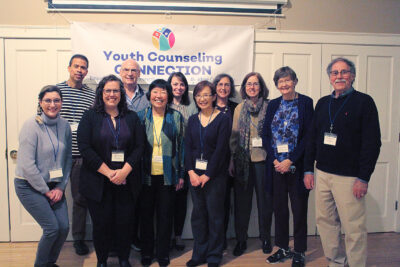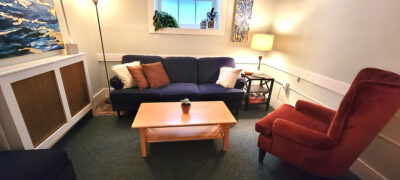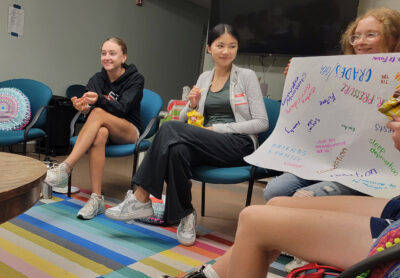In the post-pandemic world, Lexington’s Youth Counseling Connection is a vital voice promoting mental well-being in Lexington.
By Jane Whitehead

Above Left to Right the YCC Board and Staff: Nicole Manetta (Intern), Jon Suber, Emily Hayes, Jamie Katz, Bea Mah Holland, Linda Bartlett, Yvonne Lu, Betsey Weiss, Anne Khudari, Connee Counts, Bill Blout.
Steps across from the Battle Green, housed in the lower level of historic First Parish Church, are the offices of Lexington’s Youth Counseling Connection (YCC). Since opening its doors in 2012, this community-supported nonprofit has helped troubled Lexington teens and their families with free, confidential counseling and outreach services.
As YCC – originally known as Lexington Youth and Family Services (LYFS) – celebrates its tenth anniversary, those services will likely be more in demand than ever. Surveys of high school students’ experiences during the COVID-19 pandemic show a significant increase in the social, academic, emotional, and economic pressures faced by students nationwide.
In a study released in March 2022 by CDC, more than a third of high school students reported suffering poor mental health during the pandemic, with 44 per cent reporting persistent feelings of sadness and hopelessness, figures that were even higher among lesbian, gay and bisexual youth, and young women.
Calling these data “a cry for help,” CDC Acting Principal Deputy Director Debra Houry, M.D., M.P.H., noted that CDC research also shows that “surrounding youth with the proper support can reverse these trends and help our youth now and in the future.”
A Safe Space for Teens

A safe place. YCC is located in the basement of First Parish.
Years before the pandemic, offering young people “proper support” was the mission that motivated YCC’s founders. In 2008, social worker Bill Blout and developmental psychologist Connee Counts headed a group of concerned Lexington citizens committed to tackling student stress after the annual Youth Risk Behavior Survey showed high levels of emotional distress, including depression and suicidal thoughts, among Lexington High School students. A cluster of teenage suicides in Needham added urgency to their efforts, said Blout.
To realize their vision of an accessible, confidential, independent drop-in counseling service, with no insurance or out of pocket payments required, the group needed premises in the town center. For a small community start-up, funded largely by private individual donations, market rents were out of reach. The generosity of First Parish in making space available free of charge at its central location was crucial, said Counts, who with Blout still serves on YCC’s volunteer board of directors. She noted that YCC operates completely independently of the church.
YCC is also independent of the town, though its original name led many to believe wrongly that it was a town-funded service, said Counts. In 2021 YCC seized the opportunity to rebrand with a new name and logo.
“We changed our name to really demonstrate what our priorities are,” said YCC co-chair and independent clinical social worker Anne Khudari. Khudari joined the YCC board in 2016, motivated by a “passion for mental health concerns and the promotion of positive mental health messages in the community.” She noted that YCC has evolved since its founding to become a force for advocating “mental wellness for all,” by “making connections within the community, with kids, with parents, and with town personnel.”
According to the YCC website (youthcounselingconnection.org), since 2012 the organization has provided more than 1,000 therapy sessions and 2,500 drop-in hours to local youth and families, all free of charge, and an estimated 3,500 individuals have participated in free therapy services, group support, presentations, and community projects, thanks to financial support from the Lexington community.
Pandemic Impact
On a chilly winter morning, YCC Executive Director Emily Hayes welcomed a visitor to the organization’s snug offices, where in-person services are restarting after the pandemic hiatus. Hayes is a certified art therapist and licensed mental health counselor with nine years’ experience working with young people and their families. She took the reins of YCC in 2019, just months before the pandemic upended every aspect of operations.
“YCC was founded ten years ago to give youth and their families a place to turn to when they needed extra support, initially at a time when those supports were less available, but urgently needed,” said Hayes. Pre-pandemic, she said, everything was in person. “Kids would walk over from the high school to drop-in sessions,” she said. There were evening gatherings with games and art activities at the newly opened Queer Hang Space for LGBTQ+ youth, support groups for students and parents, and monthly meetings of the YCC board with an active and vocal Youth Advisory Board.
Hayes outlined the struggles that bring clients to YCC. They range from dealing with typical life stressors – fighting with siblings, not feeling able to communicate with parents, feeling isolated, dealing with social and academic pressure, figuring out where to go to college – all the way up to “I don’t want to be alive anymore,” she said. With training in trauma, family attachment, adoption, depression, anxiety, and suicide/self-harm, Hayes is well-equipped to give support across this broad range of needs.
When the pandemic hit in March 2020, YCC board member and LHS Dean for World Languages Linda Bartlett said she was “pretty impressed by how quickly they made a plan to shift to virtual,” and maintain threads of connection through the unprecedented upheaval. “Emily was brilliant,” said Khudari, as Hayes faced the challenge of moving individual clients over to Zoom and taking the support groups virtual. With in-person drop-in hours suspended for a couple of years, Hayes and the board pivoted to offering short-term solution-focused individual and family therapy, lasting up to 10-12 sessions, and when needed, help with referral to longer-term services.
The pandemic stoked demand for YCC services, said Hayes. “Last year we doubled the number of families we saw,” she said, “and this year we’re on track to move far past that.” And while the months of August and September have historically been quiet, in 2022, she said, “we walked in the door with six referrals and families starting right off the bat in August.”
“The biggest struggle right now is space and staff,” said Hayes. With a primary focus on individual and family therapy, and the resumption of in-person drop-in counseling, she also hopes to launch some new after-school groups for middle schoolers, who currently make up the majority of YCC’s caseload. “One of the biggest things I’ve seen, post-pandemic, is kids saying, ‘I don’t even know how to talk to people anymore,’” she said, “so there’s such a need for a space where kids can come together and just be.”
Peer Power
A major legacy of YCC’s first decade is the introduction of the nationally recognized youth suicide prevention program Sources of Strength (SOS), to Lexington schools. The program started at LHS in 2015 and expanded to the middle schools in 2019, when as Emily Hayes said, “the school system saw how effective and important it was to the high school.” The SOS model is based on peer-to-peer counseling, with adult guidance. Students are trained to identify peers struggling with depression and anxiety and connect them with trusted adults.
Several YCC board members act as advisors to SOS, including Linda Bartlett, executive coach and consultant Bea Mah Holland, and former YCC president Jamie Katz, who sees the program as empowering “the whole teen community to help themselves collectively.” Many SOS peer leaders have also served on YCC’s Youth Advisory Board (YAB), creating a natural pathway to YCC’s professional support services.
Bill Gao was one of the first group of SOS peer leaders, who joined the YAB as an LHS sophomore in 2016. Gao went on to study psychology and business at the University of Pennsylvania and now works in market research for a small Boston-based company. Even in middle school, he said, he was acutely aware of the pressures on some of his friends, and at LHS he was struck by “this sense of high-function depression, high-function anxiety,” and by the number of people who seemed to be doing fine but “on the inside, were going through really hard mental health issues.”
As a YAB member, Gao found the YCC board of directors “a group of the most incredible people I’ve ever met,” with their collective decades of experience as social workers, clinical psychologists, and community activists. Their joint meetings, he said, were “a collaborative space” in which the adult board members were committed to listening to and learning from the students. “They were excited to hear about our ideas. They were our biggest cheerleaders. They pushed us when they needed to. They gave us the courage that we needed, reinforcement when we needed it,” he said.
When recruiting SOS peer leaders at LHS, Gao remembered, “we tried to hit all racial groups, all activity groups, all club organizations, all grade levels.” By reaching out across a broad spectrum of the student body, he and his fellow YAB members recruited 50 peer leaders.
Rod Tavangar (LHS 2021) valued that diversity. Now in his second year at Northeastern University, studying computer science, he joined SOS as a freshman, and enjoyed the monthly SOS meetings with an adult facilitator and between 30-60 students of all ages, who would split up into small groups for discussion. Given the high pressure at LHS not only to perform academically, but to engage in multiple extra-curricular activities and clubs, he found it “really liberating” to have a space where “the whole point was to sit back and reflect on how things were going.”

YCC Youth Advisory members participate in a brainstorming session.
“You become friends with people in different years, you get to hear their experiences and learn from them, you see that you’re not the only person dealing with these struggles,” said Tavangar. In his junior year, he was invited to join the YCC YAB, and like Gao, was impressed by “how much the adults on the board wanted to hear from us,” on everything from logistics of how and where to stage events at the school, to the design of the new YCC logo.
Current YAB members Sitara Mitragotri and Veronika Moroz, both LHS juniors, appreciate the return to in-person meetings. Through YAB, said Mitragotri, she has learned to focus on “giving students resources and a platform to understand how poor mental health impacts the entire community, rather than just individuals,” and she would like to see YCC expand its reach into elementary schools, “to show young students why it’s important to care for themselves,” and to bring mental health promotion to a wider community.
“It’s really fun – there’s such a sense of community – and you can joke around, not like on Zoom,” said Moroz, who joined the SOS program in seventh grade at Diamond Middle School. “We brainstorm what might be bothering people around us, and how we can help,” she said. In a culture where “everyone is trying to show how competitive and strong they are,” she said, people can be afraid to reach out for help, and one of the key roles of the YAB is to spread the word that there are adults who really care, and that teens need not feel alone with their struggles. As YCC charts a new path in the post-pandemic world, that core message is more urgent than ever.
How do kids and families access YCC services?
YCC Clinical Services are accessible, free, and confidential.
Available to youth age 12-22 and their families
No fees or insurance needed
Crisis intervention drop-in hours and short-term therapy
After the COVID hiatus, Youth Drop-in hours are back!
Our drop-in center is open on Wednesdays from 3:00-4:30 p.m. at our location inside First Parish Church, 7 Harrington Road, Lexington. During this time, young people or families can walk in and have immediate access to a therapist
The fastest way to access clinical services is to submit our referral form online, found at the bottom of our clinical services page: youthcounselingconnection.org/clinical-services
Our office phone is 781-862-0330 but we are currently not on site every day so the best way to reach us for non-emergency questions is by email, admin@youthcounselingconnection.org.
Visit the YCC website: youthcounselingconnection.org

